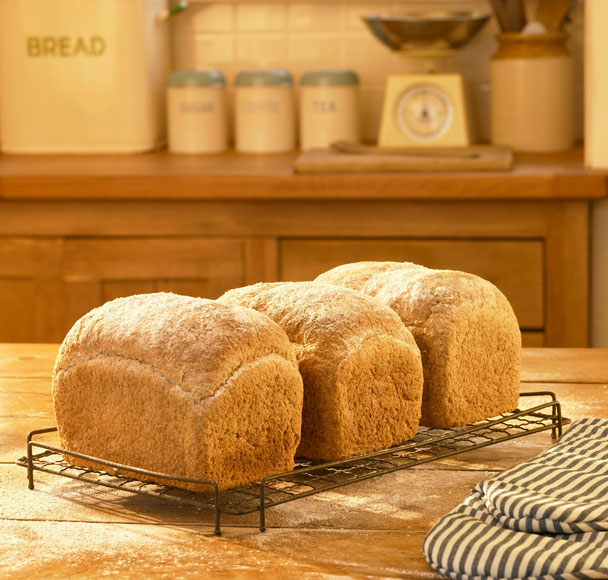The smell of darkroom chemicals makes me hungry. So do the smells of mildewed, decaying animal skins, flaky-spined old books, and woodsmoke. Unappetizing, maybe, but I associate all of these smells with my grandparents’ long-gone house, the location of the most delicious meals I’ve ever eaten.
My grandparents’ cooking and food-related rituals seemed exotic to me as a child and actually still seem a little bit exotic to me now. They drink afternoon tea (they’re not British) and have grinders for both salt and pepper. Their kitchen is always full of blooming plants: African violets, always, and amyrillis and narcissus bulbs shooting up in winter. They swear by a garlicky salad dressing that’s probably the key to their longevity, which is made by first crushing a garlic clove (or four) with salt in the bottom of a glossy wooden salad bowl that’s never permitted to come into contact with soapy water. The next step is to add oil to the garlic mixture, toss that with the lettuce, then sprinkle vinegar over the lettuce and toss it again; I remember this process in detail because it was often deputized to children. But there were other procedures and recipes—the proper way to make tea, the ingredients that went into a slow-cooked tomato sauce with fresh tomatoes and peppers, oatmeal cookies, baked coconutty granola—that I would’ve taken notes on the first time I saw them done, if only I’d been old enough then to know how to write.
The cardinal recipe, though, the one I most would like to be able to recreate at will, is for the sesame-topped loaf of perfect homemade sandwich bread that, along with a dish of softened butter, accompanied every meal, and was always available on the kitchen counter for snacking. I’ve tasted some exotic and awesome foods in my post-childhood life, but a slice of this bread, especially stuck in the toaster oven with cheese on top, is still hands-down the most delicious thing I can imagine eating. I ate it as a toddler on days when my grandparents took care of me while my mom finished her law degree, and it got me through many a meat-free holiday meal during my years as a teen vegetarian. Recently, I got my grandfather to slow down long enough to teach me how to make it—sort of.
Since my grandmother was diagnosed with Alzheimer’s a few years ago, she and my grandfather have had to move into an apartment in an assisted-living community. While even the phrase “assisted living” makes my skin crawl, the new place is actually 100% less sad and soulless than I’d anticipated. But nothing could replace that redolent house full of artifacts and history and the smell of baking bread.
My grandfather had—still has, actually, at 89—plenty of enthusiasms and hobbies besides growing lettuce and taking the photographs that he developed in the basement. He’s a brilliant and funny person with a real gift for vulgar jokes and tactless observations—at family gatherings, he’ll sometimes take me aside and say something wise, or touching, then follow it up with a cutting remark about who’s gotten fat. He and my grandmother and their four small children, of whom my mother is the eldest, spent parts of her childhood in Uganda, where he created aerial maps of cattle migration patterns that for many years hung in the Smithsonian natural history museum in Washington, D.C. The years in Africa transformed their attic into a paradise for mischief and weird imaginative games; my cousins and I played with thumb pianos and leopard skins and skinned our knees on the uneven floorboards. For the past twenty-odd years my grandfather has also been cultivating wine grapes on a plot of land in Southern Maryland and organizing an ever-growing group of volunteers who help with the annual harvest; the resulting wine has gone, over the course of my lifetime, from being idiosyncratic to eminently drinkable.
A lot of my grandfather’s time is now devoted to caring for my grandmother, and the loss of his darkroom has forced him to switch to digital photography. He still maintains a plot in the community garden, where he regularly offends the matrons who cultivate immaculate flowerbeds by ignoring their rules about weeding. Recently he tried cultivating cotton because he’d been reading about it and wanted to try it as an experiment. When my grandmother stopped being able to do much cooking, he gamely tied on her apron (literally, I have seen him wear it), and learned to make the recipes she’d been serving for the duration of their 60-year marriage.
My grandmother apologizes for her memory lapses, which make her shy and sad. Most of the time, my grandfather is incredibly patient with her. Sometimes his innate vigor must frustrate him; his weekly trips to southern Maryland to maintain the vineyard are an outlet for his preternatural energy, but the long drive can be draining, even for him. When I came over to make bread he was excited and eager to start, but first we sat with my grandmother and played a few rounds of a word game that she can still handily beat us both at. Then, as she rested in an easy chair, we began to bake.



 Pinterest
Pinterest


